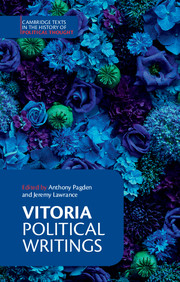Book contents
Introduction
Published online by Cambridge University Press: 05 June 2012
Summary
Francisco de Vitoria was one of the most influential political theorists in sixteenth-century Catholic Europe. By profession he was a theologian, but like all theologians of the period he regarded theology as the ‘mother of sciences’, whose domain, as he claimed at the beginning of On the American Indians, covered everything governed by divine or natural, rather than human, law – everything, that is, which belonged to what we would describe as jurisprudence. Vitoria's writings covered a wide variety of topics, from the possibility of magic to the acceptability of suicide. But it is on those which deal with the most contentious juridical issues of the period – the nature of civil power and kingship, the power of the papacy, and the legitimacy of the European expansion – that his fame chiefly rests. Vitoria, who spent most of his active life as a university professor, was also the master, and master of masters, to two generations of Spanish theologians and jurists who achieved international fame. These men, from his closest associate Domingo de Soto (1494–1560) to the great Jesuit theologians and metaphysicians Luis de Molina (1535–1600) and Francisco Suárez (1548–1617), have been known variously as ‘the Second Scholastic’ and, more parochially, as ‘the School of Salamanca’. Their learning was immense and their interests, which ranged from economic theory to the laws of motion, from eschatology to the laws of contract, practically unlimited; but it was in jurisprudence and moral philosophy that their achievements were the most far reaching.
- Type
- Chapter
- Information
- Vitoria: Political Writings , pp. xiii - xxviiiPublisher: Cambridge University PressPrint publication year: 1991

